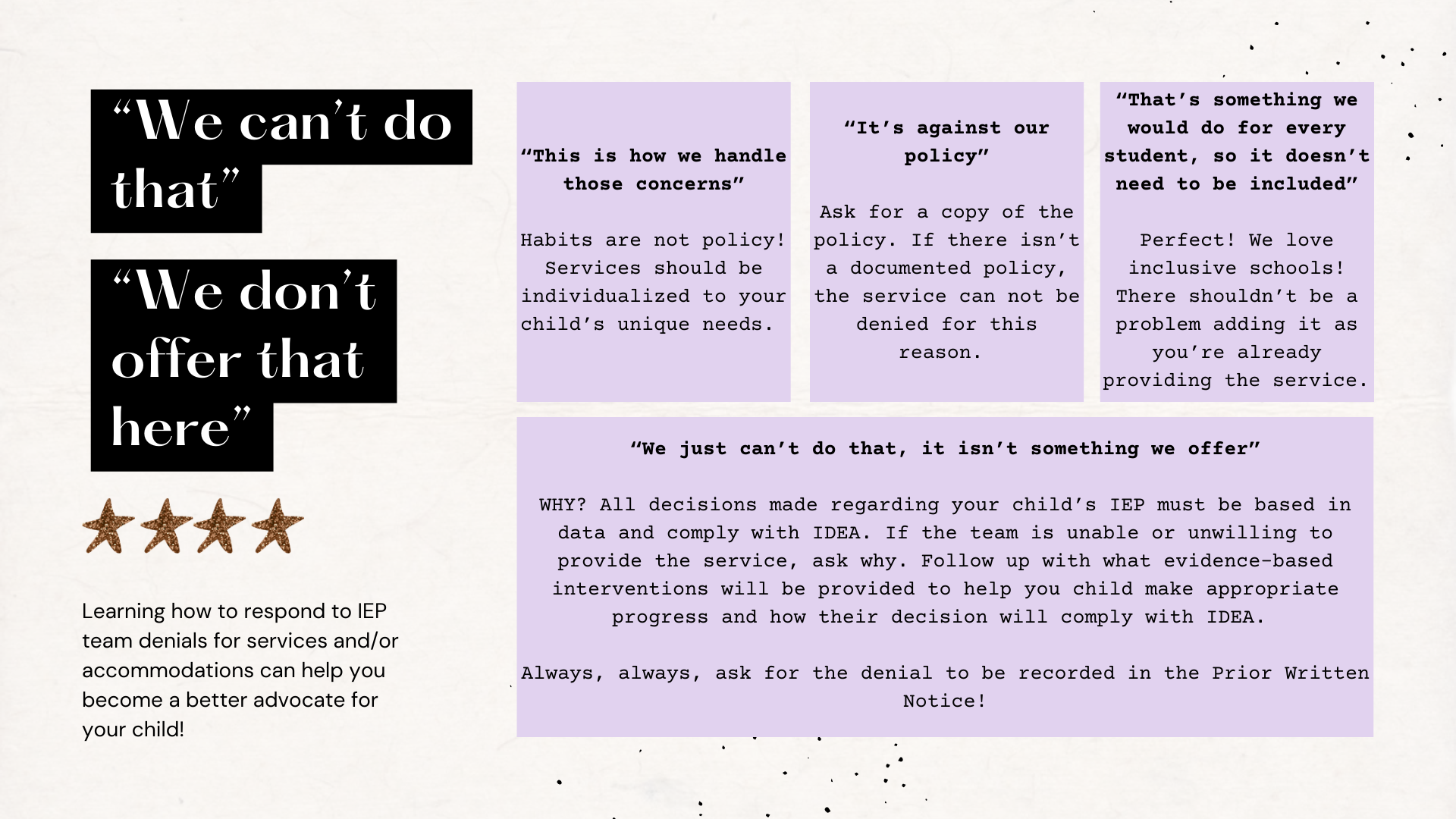Individualized Education Program (IEP) meetings can feel like a daunting task, especially when you are met with phrases like “We can’t do that” or “We don’t offer that here” when asking for additional support and services. This is a common experience that leaves many people feeling powerless and frustrated. However, statements do not have to be the end of the conversation. Understanding your rights and knowing how to advocate effectively can turn these roadblocks into steppingstones, helping your child get the support they need. Here are some effective strategies to address refusals during IEP meetings.
“This is how we handle those concerns at our school.”
One of the most powerful phrases to remember is “habits are not policies.” This means that just because something is typically done a certain way, it doesn’t mean it’s an official policy that can not be changed. Many times, “this is how handle these concerns” means the team has not been provided with alternative resources or adequate support to provide alternative services.
“It’s against our policy.”
If school team members claim, “we can’t do it because it’s against our policy” or “our policy requires we first…”, ask them to provide a copy of that policy. If they hesitate or advise they will first need to locate the policy, you can respond with “Great, can you please note that in the Prior Written Notice (PWN) that you’ll be providing that by the end of this week, so I don’t forget?” This holds the team accountable to provide the policy documentation and ensures that your request for the specific accommodation or service is documented, along with the school’s initial denial. If the written policy is not provided by the deadline, request another meeting via email and include the service/accommodation that was denied due to “policy” in the agenda. Always ask for an emailed copy of the policy.
If the school is unable to provide a written policy, you can also say:
- “Since this isn’t against a policy and the data indicates it is needed, how can we make this happen?”
- “Please include your reference and denial for services to the non-existent policy in the PWN.”
- “My child requires this service/accommodation to access their education effectively. Can we discuss how this denial meets the requirements for providing a Free and Appropriate Public Education (FAPE)?”
“We don’t need to add that because it’s already something every other student can receive.”
Sometimes, the school team members may state, “every student receives that accommodation/service, so it doesn’t need to be included in the IEP.” Remind them that the IEP is portable document meant to follow your child if they move districts or schools. Saying something like “Isn’t the IEP supposed to be portable? What if we move? I want my new school to know what you’re doing.” If they claim the service is already being provided as part of your student’s day, simply respond with “great, that makes it so much easier! Please put it in the IEP.” If the team continues to deny, request the denial for the service be included in the PWN.
No specific reasons are given and the request is not being addressed
School teams can sometimes make statements about what is or is not available based on observations or a perceived impact of a child’s diagnosis. Asking follow-up questions allows you to clarify:
- “If my child wasn’t diagnosed with X, what kind of progress would they be experiencing based on your observations?”
- “What else has ben considered in the general education setting? What has been considered in the special education setting?”
- “What research-based interventions are available or able to be considered?”
- “WHY?”
- A simple “why” can often catch people off guard and cause them to reassess their stance.
IDEA
The Individuals with Disabilities Education Act (IDEA) is clear about many aspects of special education, including the Least Restrictive Environment (LRE). Students with disabilities should be educated alongside their peers to the maximum extent appropriate. IF the school denies services or inclusion, ask them to explain how their decision complies with IDEA.
For example, if a 1:1 aide is denied, yet your child needs additional support to stay in the special education setting, question why they are being denied this support. Every school policy regarding special education services must comply with federal and state laws. If it doesn’t, point this out. If the denial is appropriate, the school team should be able to show that what is being provided is appropriate or provide additional resources that would provide inclusion in your child’s LRE.
Learning how to respond to initial denials by team members allows you to effectively advocate for your child’s needs and ensure their IEP accurately reflects the service and accommodations they require. Remember, district habits are not policies, and every decision made by the school should be backed by documented policy and compliance with IDEA.

